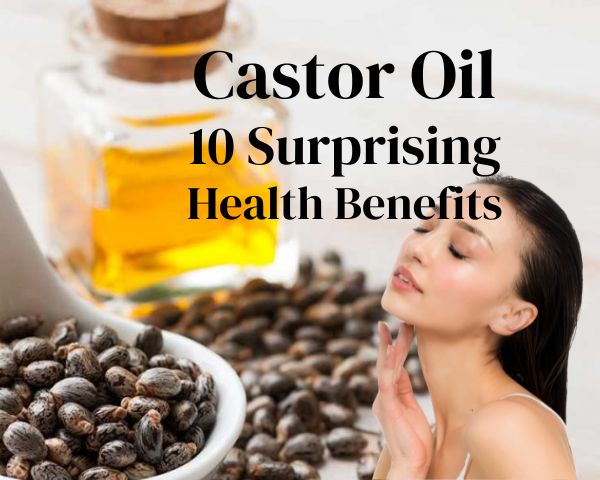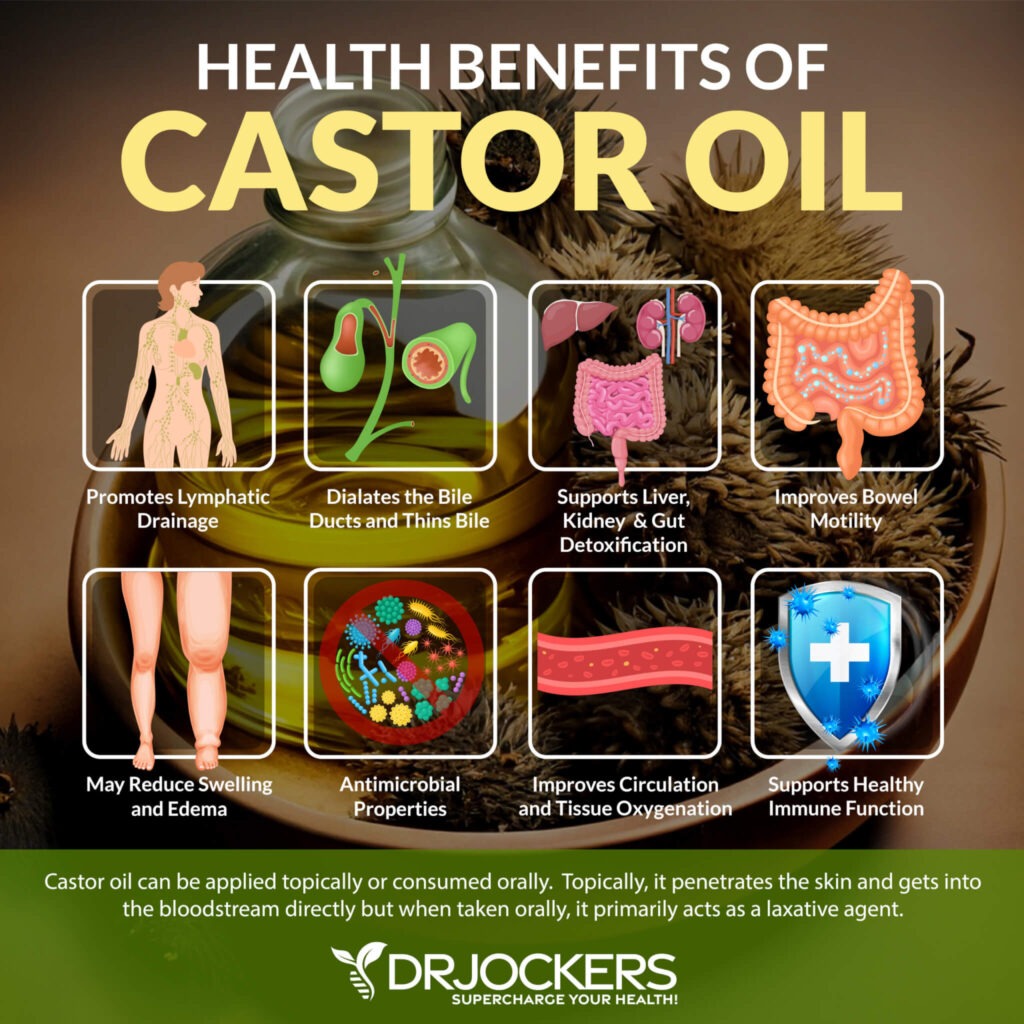Castor oil is a fatty oil that is made from the castor seeds of the castor bean plant. Castor oil has many potential health benefits, including improving bowel motility, supporting liver health, improving skin health, lymphatic function and more.
In this article, you will learn what castor oil is. You will learn about the health benefits, and I will discuss how to use castor oil. You will learn about the potential risks and how to pick and purchase castor oil. Finally, I will explain how to make a castor oil pack to help improve your health.
What Is Castor Oil?
Castor seed oil, also known as castor oil or Ricinus Communis, is made by pressing the seeds of the plant to be used for a variety of conventional purposes. It is part of the Eurphorbiaceae plant family, which is a flowering spurge family, mostly cultivated in India, South America, and Africa. Out of these places, India is responsible for about 90 percent of the castor oil global exports.
It is also among the oldest cultivated crops in the world, making up about 0.15 percent of the world’s vegetable oils. Castor oil has an amber to green color. It has a mild scent and taste. It may be used both topically and orally as a natural remedy for various ailments. It is also used in many cosmetic products sold.
Castor oil is made up of phytochemicals, including:
- Undecylenic acid
- Ricinoleic acid
Rincinoleic acid is responsible for about 90 percent of the chemical structure of castor oil. It is a fatty acid that may be responsible for the numerous health properties castor oil is used for in natural and alternative medicine. When ricinoleic acid is released in the intestines, it may bind with receptors that line the intestinal tract and the smooth-muscle cells in the uterus, which may help to promote natural healing abilities (1).
According to a 2017 review published in the Pakistani Journal of Pharmaceutical Sciences, castor oil may have many phytochemistry, biological and pharmacological activities, offering natural medicinal benefits (2). It may offer anti-diabetic, anti-inflammatory, antimicrobial, antioxidant, liver-protective, free radical-scavenging, and wound-healing benefits.
Health Benefits of Castor Oil
Castor oil has many potential health benefits. Let’s look at each of these one by one.
Promotes Lymphatic Drainage
Castor oil may help to support lymphatic drainage and may help to remove the build-up of toxins and debris in the body. If your body is overloaded with environmental toxins, microbes, and debris, they may accumulate within the lymphatic system, which is responsible for filtering bacteria. This may cause lymphatic stagnation.
2007 research published in the International Journal of Toxicology has found that injecting rats with castor oil helped to suppress tumors that developed as the result of liver damage. (3). As castor oil gets absorbed through the skin, it may increase blood circulation, lymphatic drainage, and lymphocyte production, which may boost immune health and benefit those with a compromised immune system.
Anti-Bacterial, Anti-Fungal, and Anti-Inflammatory
Castor oil may also offer anti-microbial and anti-inflammatory benefits. It may be a great massage oil for sore muscles, joints, and tissues. According to a 2000 study published in Mediators of Inflammation, ricinoleic acid in castor oil may offer anti-inflammatory and analgesic benefits (4).
A 2009 randomized controlled trial published in Phytotherapy Research has found that using 0.9 milliliters of castor oil capsules three times a day had similar effects for knee arthritis as 50 milligrams of diclofenac sodium (5).
Moreover, castor oil may have immune health-boosting effects by fighting microbes. According to a 2016 study published in BMC Complementary and Alternative Medicine, it may help to fight a variety of different types of bacteria, including Staphylococcus aureus, Escherichia coli, and Pseudomonas aeruginosa (6). When used internally, it may help to relieve constipation, thus elimination, and as a result, the removal of microbes and toxins in the gut.
Thins Bile and Dilates the Bile Ducts
Bile is a greenish-brown liquid or digestive juice that emulsifies fats for your small intestine to absorb. It moves from your liver to the gallbladder, and then your body stores it until it needs it for the digestion of food.
Bile is essential for digestion and the absorption of nutrients. Problems with bile production, bile flow, and bile acid malabsorption may lead to abdominal pain, bloating, gas, and other digestive issues.
Using castor oil packs over the abdomen and liver area may not only help liver detoxification but may also help to thin the bile, dilate bile ducts, and improve bile flow. It may also help to relieve painful spasms and cramps of the bile ducts and gallbladder.
With that said, though anecdotal and personal evidence seems to support that castor oil may benefit bile health, we need more research evidence to back this up.
Supports Liver Detoxification
Your liver serves vital functions in the body and is critical for the process of detoxification. The liver helps circulate fluid in the body and transforms toxins into a substance which then can be dissolved, flushed down the bile ducts, relocated into the small intestine, or eliminated through stool.
Using castor oil packs over the liver area may help to support liver detoxification and liver health and reduce related health symptoms. According to a 2012 systematic review published in the International Journal of Naturopathic Medicine, using castor oil topically may help to support liver function and cholesterol levels (7).
Improves Bowel Motility
To relieve Constipation, take one teaspoon of castor oil in the morning.
Supporting digestion may be one of the main potential health benefits of castor oil. Castor oil packs may help to improve bowel motility, which means a decreased risk of constipation and fewer digestive issues. According to a 2012 systematic review published in the International Journal of Naturopathic Medicine, using castor oil topically may help to reduce constipation (7).
According to a 2011 clinical trial published in Complementary Therapies in Clinical Practice, castor oil packs may help to reduce constipation, straining during bowel movements, and the risk of incomplete bowel movements (8). According to a 2021 pilot study published in the World Journal of Gastrointestinal Pharmacology and Therapeutics, it may help to cleanse the colon before a colonoscopy (9).
Reduces Pain, Swelling and Edema
Castor oil may also help to reduce pain, swelling, and edema. According to a 2018 study published in Polymers in Advanced Technology, castor oil may help to reduce inflammation pain and support wound healing (10). According to a 2000 study published in Mediators of Inflammation, ricinoleic acid in castor oil may offer anti-inflammatory effects, which may help to decrease pain and swelling (4).
A 2009 randomized controlled trial published in Phytotherapy Research has found that castor oil may help to reduce symptoms of knee arthritis (5). Thus, it may help to lower pain and swelling linked to this condition.
Moreover, poor circulation and poor lymphatic flow may increase swelling and edema. Because castor oil may help to support the lymphatic system and circulation, it may also reduce the risk of edema.
Improves Circulation and Tissue Oxygenation
Using castor oil may also help to improve circulation and tissue oxygenation. According to the National Heart, Lung, and Blood Institute, the lymphatic system may influence the heart, lung, brain, and other organs health (11). By supporting lymphatic circulation, castor oil may help to support the cardiovascular circulatory system and tissue oxygenation too and reduce fluid retention and edema (3).
Castor oil is also commonly used in wound healing (10). Its wound-healing effects may partly lie in supporting circulation, tissue oxygenation, and blood flow. However, we still need more research on the potential circulatory and tissue-oxygenating benefits of castor oil.
Supports Healthy Immune Function
Castor oil may support healthy immune function in a variety of ways. As we already discussed, it may help lymphatic function, which spreads across your entire body and helps to remove excess fluid, protein, and waste (11).
Castor oil may support lymphatic drainage and blood flow. It may support the production of the lymphocyte white blood cells that fight bacteria, which may assist the health of the thymus gland, which is responsible for creating T cells for the immune system.
It may also also help to fight and remove microbes from your body. According to a 2016 study published in BMC Complementary and Alternative Medicine, it may help to fight a variety of different types of bacteria, including Staphylococcus aureus, Escherichia coli, and Pseudomonas aeruginosa (6).
Moisturizes Skin
Castor oil also offers skin-protecting benefits. 100 percent pure castor oil is natural and free of synthetic chemicals. It is rich in healthy fatty acids that may boost skin health. Using it topically may help moisturize your skin, prevent water loss from the skin, reduce dry skin, and improve irritated skin.
According to 2005 research published in the Journal of Wound, Ostomy, and Continence Nursing, it may help the recovery of pressure ulcers and wound healing thanks to its moisturizing and antimicrobial benefits (12). Castor oil may also mix well with coconut oil, almond oil, and olive oil, which are also beneficial for your skin health.
Use a very small amount of castor oil on the tip of your finger to massage the skin area gently for 5-10 minutes. Do not scrub.
Supports Wound Healing
Moisturizing the skin is not the only skin-related potential benefit of castor oil. It has been used to improve wound healing as a natural remedy for a long time. A 2018 study published in Polymers in Advanced Technology has found that it may help to reduce inflammation pain and support wound healing (10). According to 2005 research published in the Journal of Wound, Ostomy, and Continence Nursing, it may help wound and pressure ulcer recovery (12).
According to a 2016 study published in BMC Complementary and Alternative Medicine, it may help to fight a variety of different types of bacteria, including Staphylococcus aureus, Escherichia coli, and Pseudomonas aeruginosa (6). This may help to reduce infections of the skin, reduce the risk of a staph infection, and support wound healing.
How to Use Castor Oil
If you are interested in the potential benefits of castor oil, you may wonder how to use castor oil. Here are some potential options for using castor oil, both topically and orally.
As a Laxative for Constipation Relief
You may try castor oil as a laxative for constipation relief, taken orally. The common oral dose to treat constipation is between 15 to 60 mL, as a single dose. This is between one and four teaspoons, taken in no more than 1 tsp at a time. Give yourself 3-5 hours between taking it if you want to take more than 1 tsp daily. For children between 2 and 12, the dose is generally 5 to 15 mL once a day, and for babies under age 2, it’s 5 mL once a day.
You may mix it in water before drinking it. Always read the directions carefully. Ideally, start on the low end of the dosage and see how your body handles it. Don’t take castor oil internally for more than seven days. And always consult your healthcare practitioner before using it orally. Stop using it if you experience any side effects.
Castor oil is a great laxative that helps initiate peristaltic or smooth muscle contractions in the intestines. If you have intense cramping pains on a regular basis, I don’t recommend castor oil for internal usage. However, if you struggle with sluggish bowels, it can speed them up.
STEP #1
In the morning upon arising, drink a big glass (8-16oz) of water and wait 10 minutes.
STEP #2
Then do 1 tsp of castor oil. If constipation has not been relieved than do 2 tsps the next day. You can go up to 3 tsps daily as long as you don’t have worsening Gl Symptoms.
Support Hair and Eyebrow Growth
For Dandruff and Hair Growth:
- Step #1 – Massage 2-3 tablespoons castor oil into your scalp and hair, and spread it all over your hair.
- Step #2 – Let the oil set into your hair and scalp. You can wear a night cap over your hair at night.
- Step #3 – Wash it out in the morning.






2 Replies to "CASTOR OIL - 10 Surprising Health Benefits"
Sue Aldridge October 2, 2024 (10:59 am)
Thank you, Jane….I LOVE your articles….you are the real deal, which is so different from many on the internet pushing their products, true or not. Your articles have always proved to be valuable information–I appreciate your bravery to tell it all like it is!!
Jane Barthelemy February 23, 2025 (1:17 am)
Hi Sue, THANK YOU for your kind words. Yes! Castor oil is so amazing. My husband puts it on his eyes every night before bed. His vision has improved and his cataracts are GONE! Jane